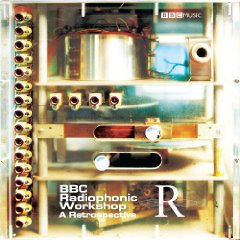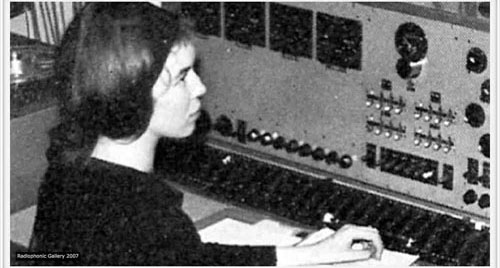2008 has been one of the most significant years for that strange and peculiar ragbag of eccentric genii that made up the BBC Radiophonic Workshop. After sadly limping along for many years, the organisation closed its doors a decade ago, one of the more poignant victims of cheap digital technology and the bedroom aesthetic. This collection of releases is tellingly significant in terms of the Workshop’s importance.
The unaccountable legacy, though, is an imaginative one. How many people in this country associate the future with electronic sound? The Workshop could well be the reason why. For those growing up from the beginning of the sixties onwards, television had the power to bewitch; it was an art form still capable of having a spectacular feel of the event.
Through providing jingles, effects, incidental music, theme music for TV and radio (especially for educational school programmes) the Workshop enjoyed a truly inestimable influence. Their output reached the lives of millions, every age and every walk of life, way beyond the reaches of even the biggest of rock bands. They set a precedent by marrying electronic sound composed in the most painstaking and laborious manner imaginable and elevated the sometimes cheapest of images into something uncanny. Maybe the role of Dr Who cannot be over-estimated enough – a pop cultural phenomenon possibly as significant as Elvis but wildly stranger.
Nearly everything across these three releases is imbued with a sense of both innocence and mystery. As well as the impact on all electronic music since, the early experiments at the Workshop have now been used by a variety of labels and artists to build an alternative history of English music, a parallel universe where these compositional sounds and methods were the norm. The most prominent and inventive of these being Broadcast, the Ghost Box label, Mordant Music and Moon Wiring Club.
The magic and purity here rises above the sometimes devastated personal lives of the composers. Daphne Oram, co-founder of the workshop, left soon after its inception to build her own musical system of Oramics (a schema for literally drawing sound) and remained in obscurity until the excellent Oramics set released last year on Paradigm Records. This is in parallel with the ongoing digitisation and archiving of her entire works at Goldsmiths University and a major event earlier this year on the South Bank. Delia Derbyshire struggled with alcoholism and a string of disastrous relationships, working menial jobs and abandoning music for over two decades. Ex-Spaceman Peter Kember and eventual romantic stability prompted her out of retirement, the rise of post-rave electronica convincing her that music had finally come round to her way of thinking. Tragically, she succumbed to renal failure brought on by cancer before the first of her projects could be completed. John Baker succumbed to alcoholism, was sacked in 1974 and died in poverty in 1997 having never recorded another note.
In 2008 then, miraculously, Derbyshire is now also receiving the same treatment as Oram at Manchester University, Trunk Records released two superb compilations of unreleased Baker music earlier this year (following the excellent, Derbyshire-featuring Tomorrow People soundtrack) and Mike Patton has programmed (the quite batty) White Noise’s Electric Storm for a run through at ATP this year (another Derbyshire collaboration). To round off the year, then, we now have these superb releases – two reissues from 2002 and a new double retrospective all on the Mute label.
BBC Radiophonic Music

Also known as The Pink Album. There is no word for this record other than ‘essential’. Originally released in 1968 and reissued in 1971, it covers material composed in the first 10 years of the Workshop.
This focuses entirely on the work of Derbyshire, Baker and David Cain and there are station idents, jingles, sound effects and atmospheres as well as more ‘conventional’ musical pieces. John Baker’s work is largely made up of melodically complex ad generally upbeat tunes that are almost entirely composed of non-musical sounds. ‘Christmas Commercial’ sounds like a proto- Art Of Noise track with the entire piece consisting of a cut and pasted cash register. ‘Radio Nottingham’ is unbelievable, moving through a variety of different phases in a minute and a half with sounds being generated by corks out of bottles, a ruler, a spring and his specialist submarine bubbles. Derbyshire’s work would take several books to eulogise. ‘Blue Veils and Golden Sands’ is an eerie drift, out of this universe and closest in spirit to Aphex’s Ambient Works Volume Two. ‘Ziwzih Ziwzih 00-00-00’ is as bizarre as it is indescribable while still remaining catchy – a cybernetic harpsichord, earth’s core pulses, voices from another world. It kind of sounds like The Residents. It is the compositional techniques, the form that contribute towards the otherworldliness. Did I already say essential?
The Radiophonic Workshop

With its electronic fetishists dream cover, The Radiophonic Workshop was released in 1975. Barring two tracks, everything on this album was composed specially for the release and gleefully embraced stereo (the Workshop was still reigned in to monophonic production at the time). Derbyshire had gone by this point, rejecting the move to less concrete-sounding activity. Various musicians owe their entire careers to this album. Luke Vibert for one, Mike Paradinas and Richard James to name others. Once again, the music bounces between the sprightly and the ethereal. Glynis Jones’ few pieces are especially evocative of strange inner landscapes but it’s all wonderful. There are noticeable differences, though, with the introduction of keyboard melodies being particularly obvious. While this does point to what would lead to the demise of the workshop, it doesn’t detract from the majesty of it all.
BBC Radiophonic Workshop – A Retrospective

Finally we have the new compilation which covers 50 years of material across two CD’s. Over 100(!) pieces tell the story and track the stylistic and compositional changes. The quality quotient is ridiculously high and the compilation sustains itself magnificently. Desmond Briscoe and Daphne Oram finally get a look in, as does the amazing Maddalena Fagandini whose ‘Interval Signal and Time Beat’ literally constructs a peculiar melody out of the passing of time. ‘Ideal Home Exhibition’ is akin to encountering a Martian gallery under the Pacific Ocean. Sadly, it does come unstuck at the end – gone is the innovation and those uncanny and childlike melodies, gone is the adventure and the wonder. The final few tracks are simply programme themes, not bad or anything but simply uninteresting. Peter Howell’s theme music to Michael Palin Full Circle is just that, a mere signature tune: the norm. However, it serves to remind us that, 30 years previously, the abnormal would have been the norm.
It doesn’t matter. Worlds of imagination dominate all of these releases; new planets, new emotions all recalled from another past that seems both surreal and somehow impossible. As I said before, this is music of enormous innocence and emotional purity, like nothing the world has ever heard or will hear again.


